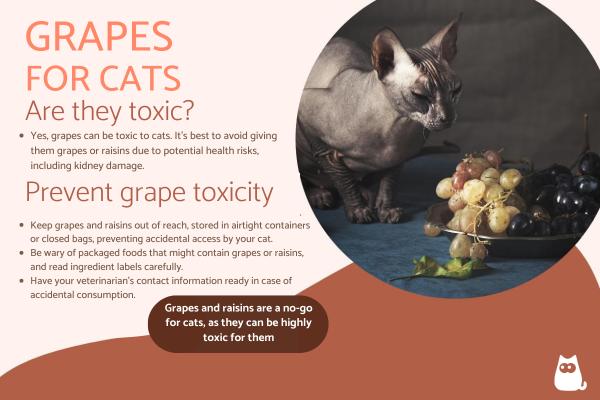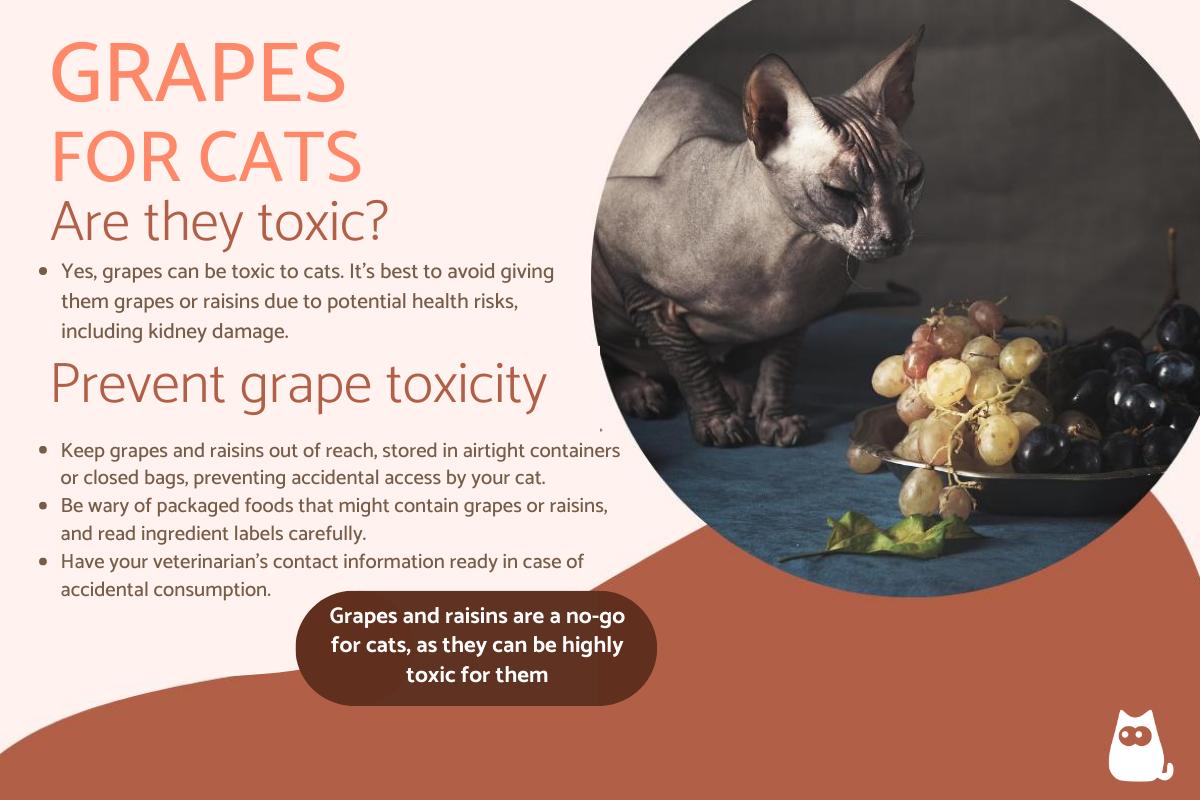Can Cats Eat Grapes and Raisins?



See files for Cats
Grapes, those succulent and vibrant fruits that delight our taste buds, have long been an emblem of nature's bounty. However, grapes have long been recognized as a red flag for dogs due to their high toxicity to this species. In dogs, ingestion can trigger dire consequences, including the onset of acute renal failure that often proves fatal. Yet, when it comes to our feline friends, the answer is not so simple.
In the following AnimalWised article, we will explore whether cats can eat grapes or raisins, while also delving into the associated risks.
Are grapes safe to cats?
Since 1989, incidents of grape-related poisoning have cropped up within the canine community, sparking concerns about the safety of grapes for dogs. Ingesting grapes triggers a wave of gastrointestinal distress followed by a swift onset of acute renal failure, which sadly often proves fatal for these animals.
Grape toxicity isn't a frequent occurrence in cats, but there have been recorded cases. Roughly 15% of dogs and cats that consume grapes or raisins exhibit signs of toxicity, which might include restlessness, decreased appetite, and vomiting.
In a particular study, kidney damage was observed in less than 1% of cases (all of which were dogs). However, instances of kidney damage in cats following grape or raisin ingestion have been documented, confirming the potential, albeit infrequent, risk associated with these fruits.
Another compelling reason to ensure grapes are out of reach for inquisitive cats is their potential to become a choking hazard, particularly when they contain seeds.
Are raisins safe for cats?
The answer is yes – cats should avoid both. Raisins can be just as harmful to your pet's health, so it's smart to keep them well out of reach. It's worth noting that raisins are often found in other goodies like cookies, cakes, and biscuits. When your cat's around, be on the lookout, as they might try to snatch a bite. Keeping your feline friend safe means being aware of these potential encounters with raisin-containing treats.
Why are grapes toxic?
Although the exact toxin remains a mystery, there's an interesting observation: both seedless and seeded grapes have caused poisoning cases. This suggests that the toxin probably isn't in the seeds. Instead, the prevailing idea is that it's a water-soluble substance present in the grape's flesh.
A noteworthy piece of evidence points towards tartaric acid as a possible culprit. This acid is found in varying amounts in grapes and raisins and could be linked to the issue. While we're still piecing things together, this avenue of investigation holds promise for uncovering why grapes and raisins can be harmful to our furry friends.
Explore our additional article to discover the recommended fruits and vegetables for cats.

What is grape poisoning in cats like?
The initial indicators of grape poisoning that could manifest within the initial 12-24 hours of ingesting the fruit encompass:
- Lethargy
- Vomiting
- Diarrhea
- Reduced appetite
- Discomfort in the abdominal region
As the next 24 hours unfold (48 hours post-consumption), more pronounced signals of kidney dysfunction might surface, including:
- Unusual thirst and increased urination
- Heightened episodes of nausea and vomiting
- Loss of appetite
- Noticeably pungent breath
- Neurological symptoms that might escalate to seizures and even coma
Ideally, immediate treatment should be pursued for cats that have consumed grapes. Within the initial 12 hours, some of the potential kidney damage could still be preventable. Yet, once kidney harm sets in, it's often irreversible to a significant degree.
For a deeper understanding, don't forget to check out our article on the causes of kidney issues in cats.
What to do if my cat eats grapes?
If your cat has ingested grapes, or even just a single grape, it's crucial to reach out to a veterinarian without delay. Although infrequent, the potential ramifications of acute kidney disease are exceptionally alarming. In cases like these, time is of the essence, as substantial harm can transpire within a remarkably brief span.
While grape consumption might not always result in intoxication for cats, it's still wise to monitor your pet's condition closely. This vigilance helps catch any potential signs of intoxication early on, which could include symptoms like vomiting, diarrhea, loss of appetite, and weakness.
Should any of these symptoms emerge, swift treatment is crucial.
Gain further insights on how to respond in the event of cat poisoning by exploring our other article.
If you want to read similar articles to Can Cats Eat Grapes and Raisins?, we recommend you visit our Homemade diets category.
- The European Pet Food Industry. (2021). Nutritional guidelines. Grape and raisin toxicity in dogs.






